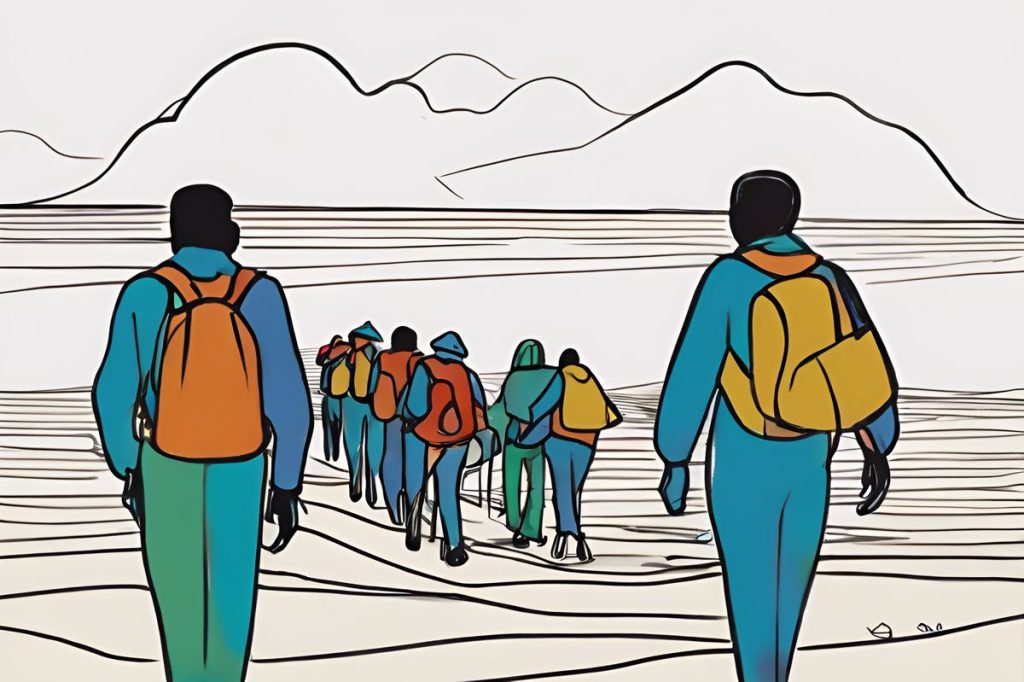Authorities responded to 22 irregular migrants arriving by sea off Cape Greco, with a 44-year-old navigator detained for investigation. The group, including men, women, and minors, was taken to a temporary reception center in Protaras, highlighting the ongoing challenges and need for international cooperation to manage such situations with dignity and respect.
What are the challenges and responses to migrant arrivals by sea?
The challenges of migrant arrivals by sea include managing the safety and processing of individuals, maintaining border security, and upholding humanitarian values. Responses involve immediate aid, setting up temporary shelters, and international cooperation to create comprehensive migration policies and uphold the rights of migrants with dignity and respect.
The Incident at Cape Greco
On a recent Friday afternoon, authorities were alerted to the arrival of 22 irregular migrants who reached the shores off Cape Greco. This event unfolded when a 44-year-old man, presumed to be the navigator of the vessel, was taken into custody to aid police investigations. The boat, one of four sighted in the region, was the only one about which details have emerged.
A coast guard patrol was quick to respond, escorting the migrants to a temporary reception center in Protaras. Amongst the 22 individuals were 15 men, three women, and four unaccompanied minors, all seeking refuge and a new beginning. The police documented their details and are currently investigating the incident. The suspected navigator was scheduled to appear before the Famagusta district court the following day.
The Response and Moving Forward
Following the arrival of the migrants, local authorities responded by providing immediate assistance. A temporary shelter within Protaras welcomed the individuals, offering a momentary relief from their perilous journey. Resources and support were mobilized to ensure their basic needs were met, showcasing a swift humanitarian response from the local community and authorities alike.
Despite such efforts, challenges persist. The fate of the other three boats remains unclear, and authorities are on high alert for further arrivals. The Mediterranean has long been a hotspot for such migratory movements, with Cyprus being one of the many European countries grappling with the complexities of irregular migration. These events underscore the need for comprehensive migration policies and international cooperation to manage such situations humanely and effectively.
The Broader Context of Migration
The Mediterranean Sea is often seen as a gateway for those fleeing conflict, persecution, or poverty. While the journey is dangerous, the hope for a better future drives many to take the risk. The incident near Cape Greco is a part of a much larger issue that the European Union and neighboring countries face. It highlights the ongoing struggle between maintaining border security and upholding the humanitarian values at the core of many societies.
In recent years, the influx of migrants and refugees has prompted a range of responses, from the fortification of borders to search and rescue operations. Countries along migration routes have had to adapt rapidly, setting up reception centers and working with international organizations to process arrivals according to domestic and international laws. The situation is dynamic, and policies continue to evolve as nations seek sustainable solutions to this global challenge.
The Importance of Solidarity and Support
As irregular migration persists, the importance of solidarity and support within the international community becomes increasingly apparent. There is a need for a cohesive strategy that addresses both the welfare of migrants and the concerns of host communities. Shared responsibility can go a long way in distributing the burden and benefits of migration, while ensuring that individuals like those who arrived in Protaras are treated with dignity and respect.
The involvement of various stakeholders, from local non-profits to international organizations, plays a critical role in managing the situation. Education, integration programs, and legal pathways for migration are just some of the measures that can alleviate the pressures of irregular migration. As countries navigate these complex issues, the fundamental rights of individuals in transit must remain a priority.
What are the challenges and responses to migrant arrivals by sea?
The challenges of migrant arrivals by sea include managing the safety and processing of individuals, maintaining border security, and upholding humanitarian values. Responses involve immediate aid, setting up temporary shelters, and international cooperation to create comprehensive migration policies and uphold the rights of migrants with dignity and respect.
What was the recent incident at Cape Greco involving irregular migrants?
Authorities responded to 22 irregular migrants arriving by sea off Cape Greco, with a 44-year-old navigator detained for investigation. The group, including men, women, and minors, was taken to a temporary reception center in Protaras. The incident underscores the ongoing challenges and need for international cooperation to manage such situations with dignity and respect.
How did local authorities respond to the arrival of the migrants at Cape Greco?
Local authorities provided immediate assistance, escorting the migrants to a temporary shelter in Protaras. Efforts were made to ensure their basic needs were met, showcasing a swift humanitarian response from the local community and authorities. However, challenges persist as the fate of other boats remains unclear and authorities remain vigilant for further arrivals.
What is the broader context of migration in the Mediterranean region?
The Mediterranean Sea serves as a gateway for individuals fleeing conflict, persecution, or poverty, with many risking dangerous journeys in search of a better future. The arrival of irregular migrants at Cape Greco is part of a larger issue faced by the European Union and neighboring countries. The incident highlights the need for comprehensive migration policies, international cooperation, and a balance between border security and humanitarian values.

